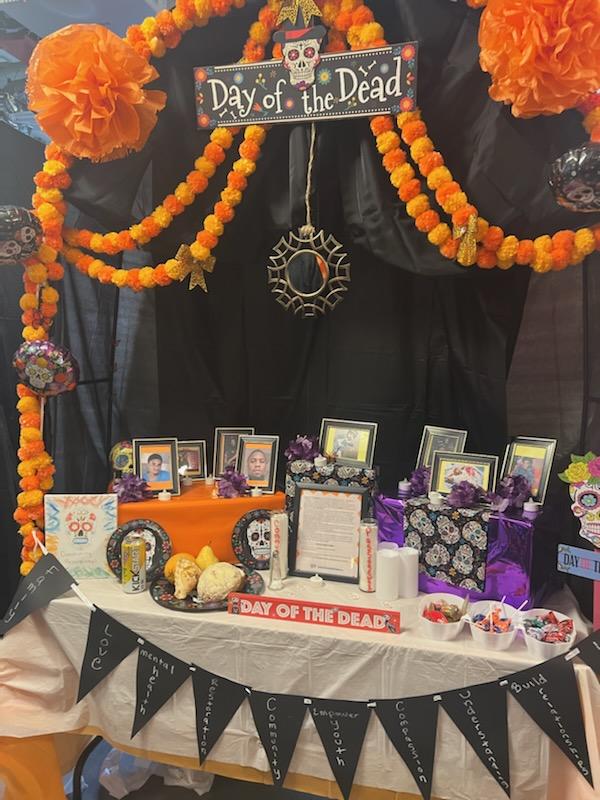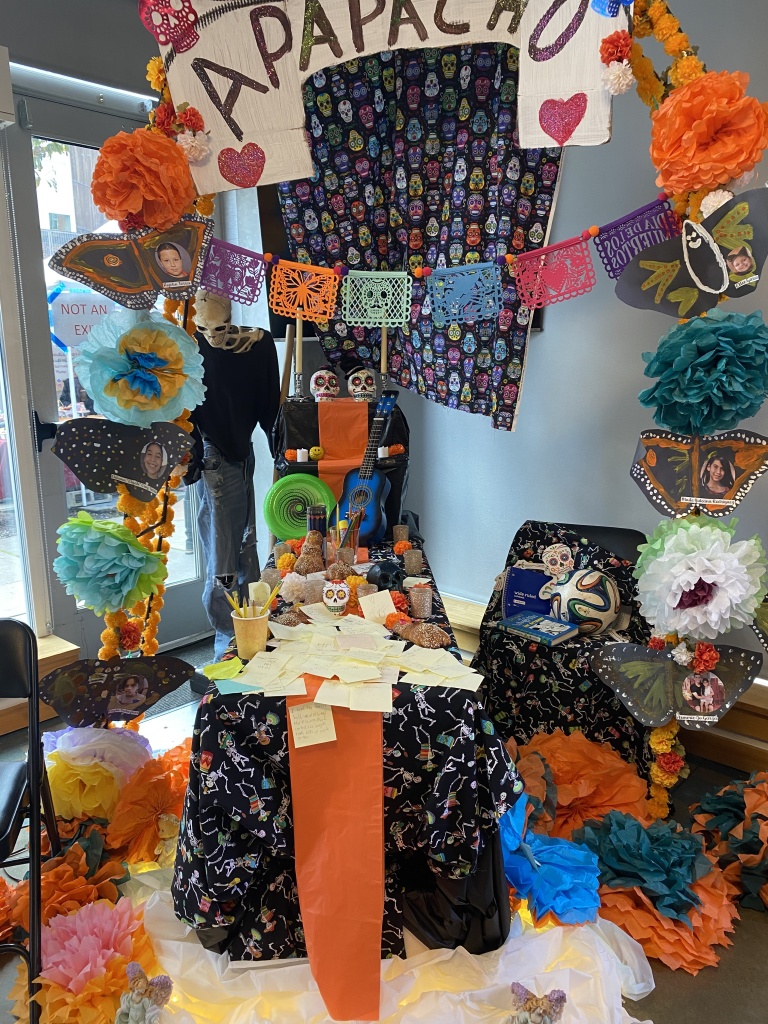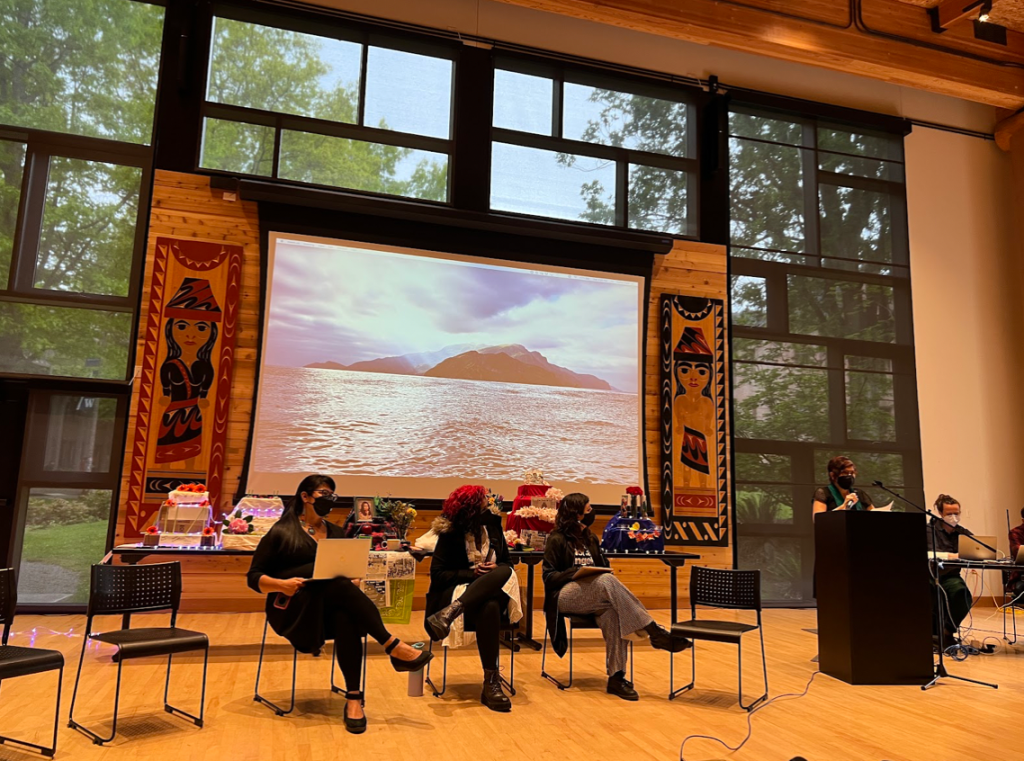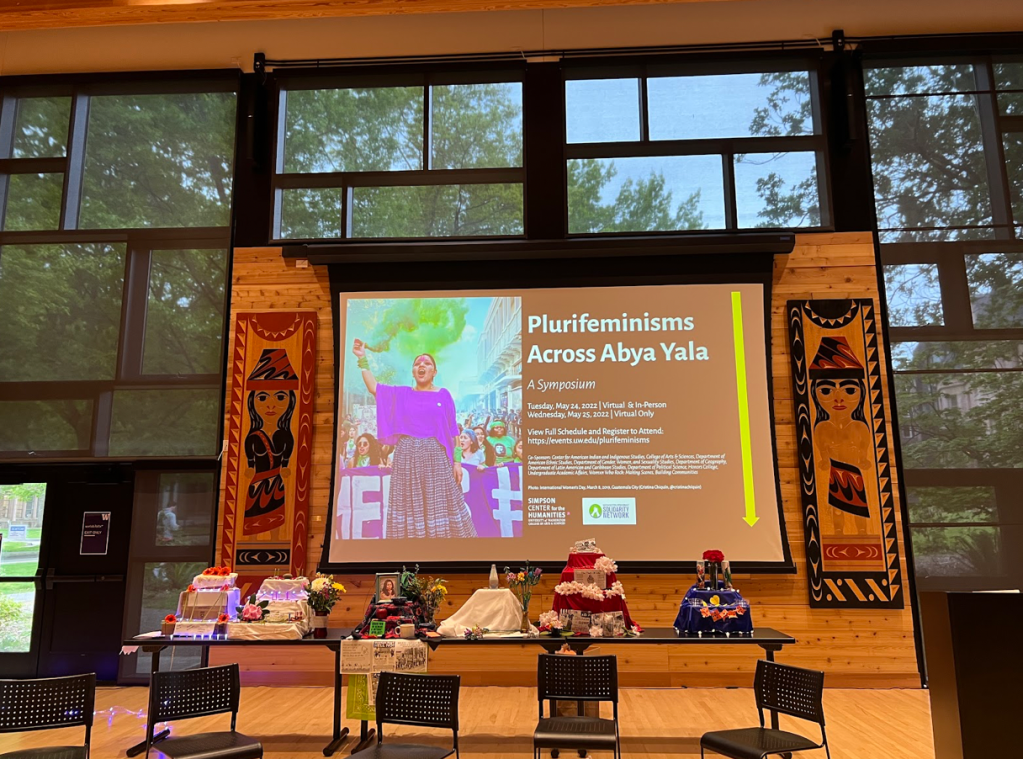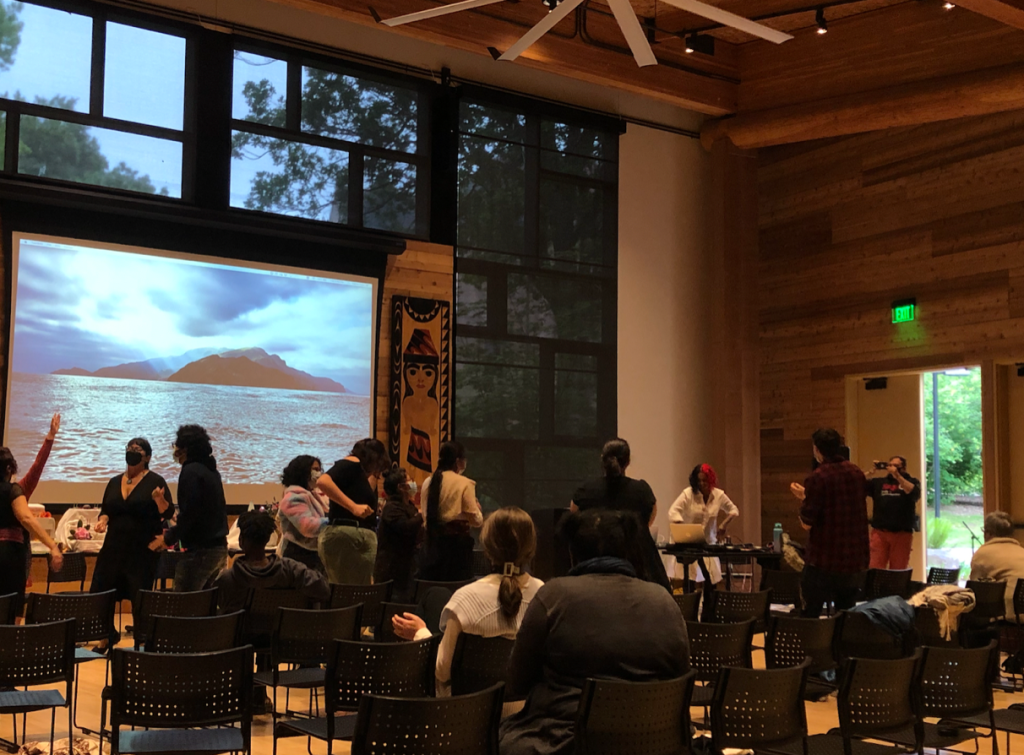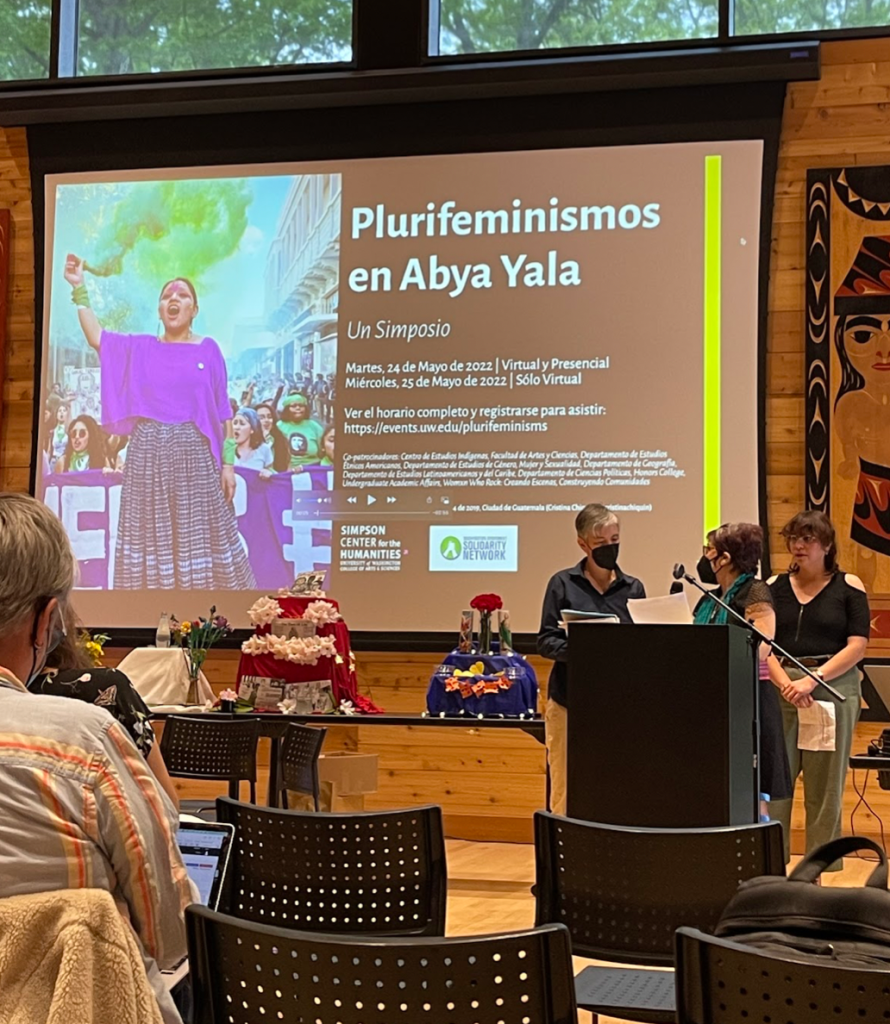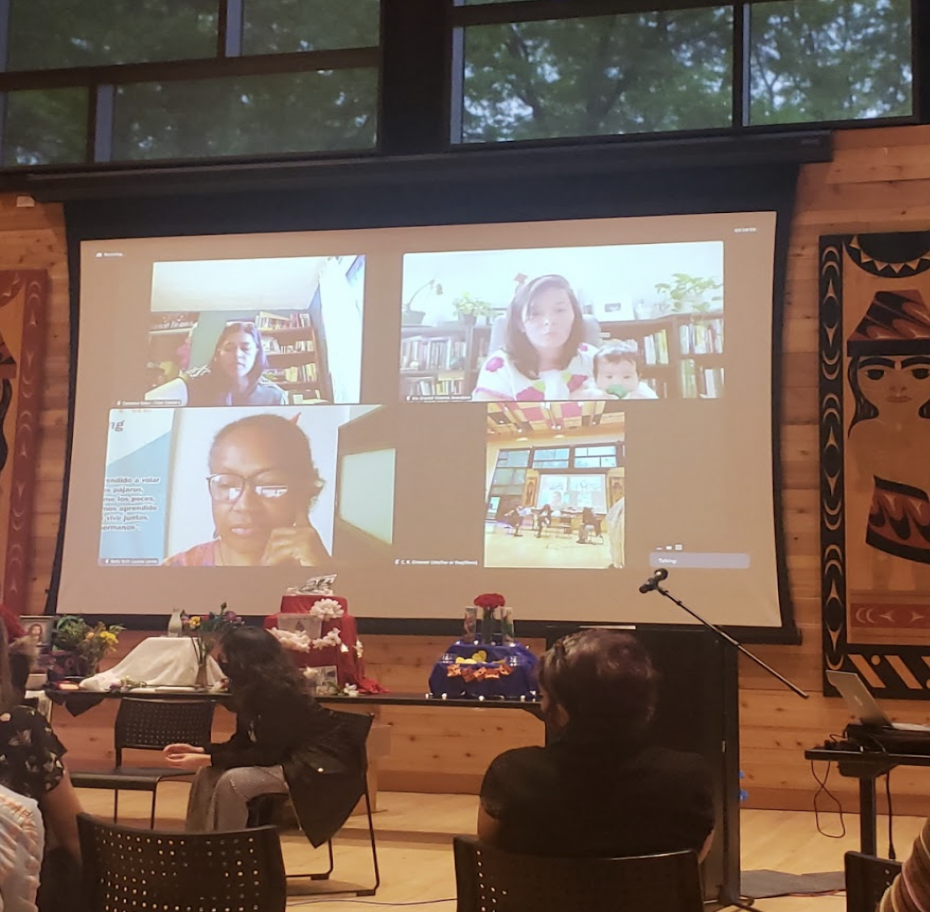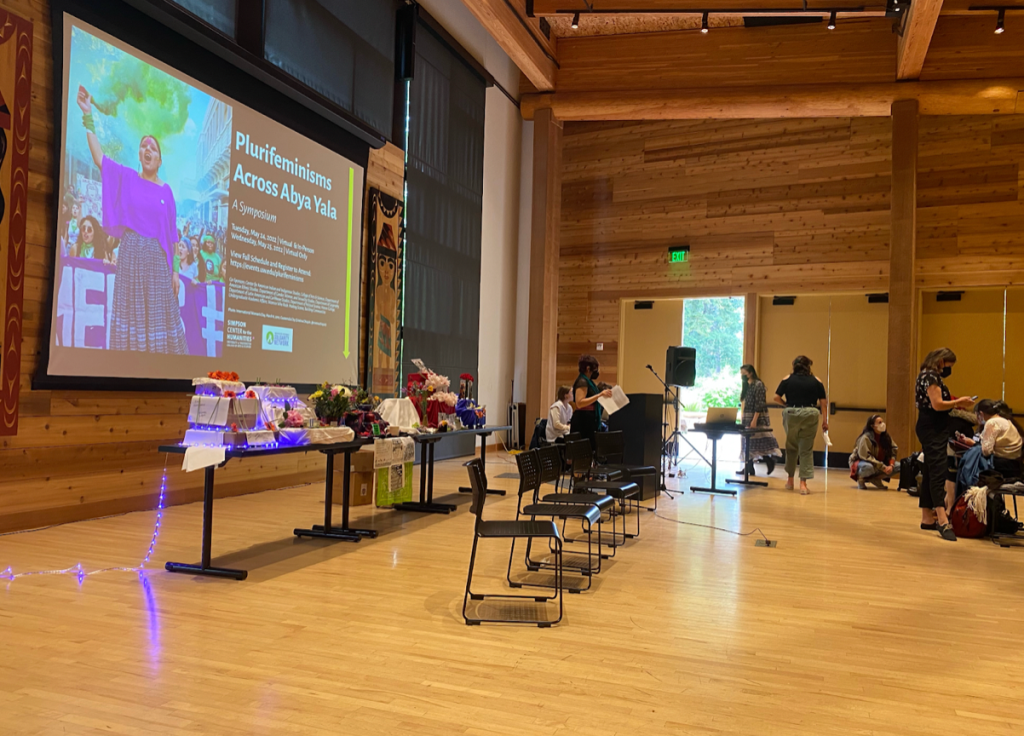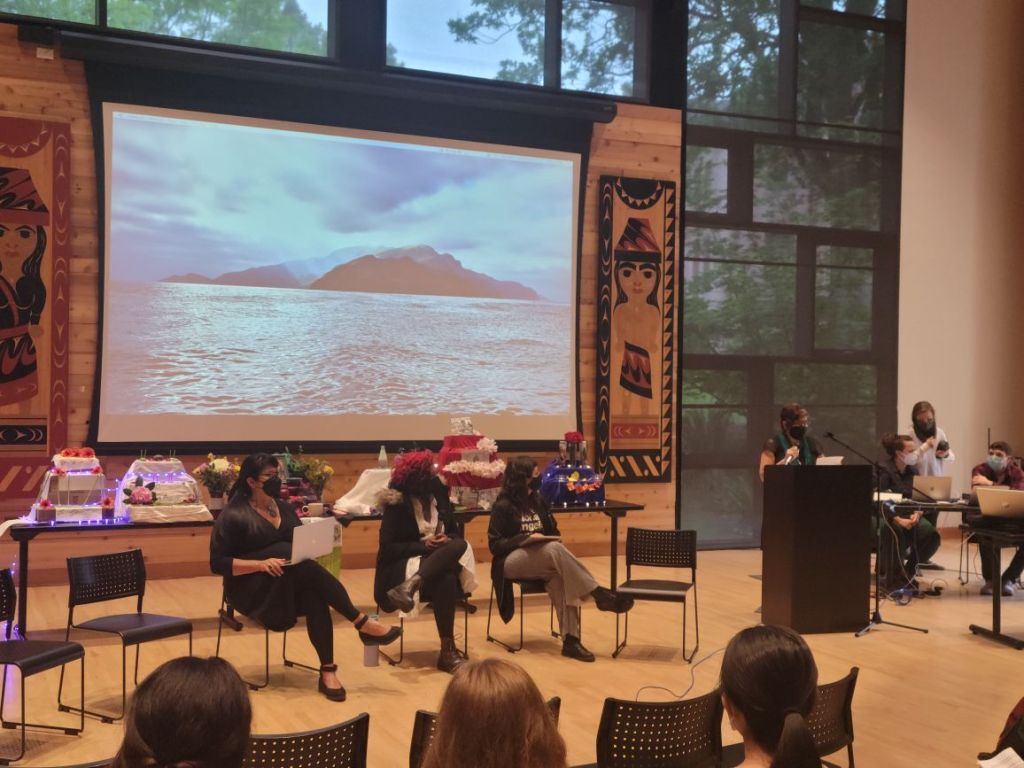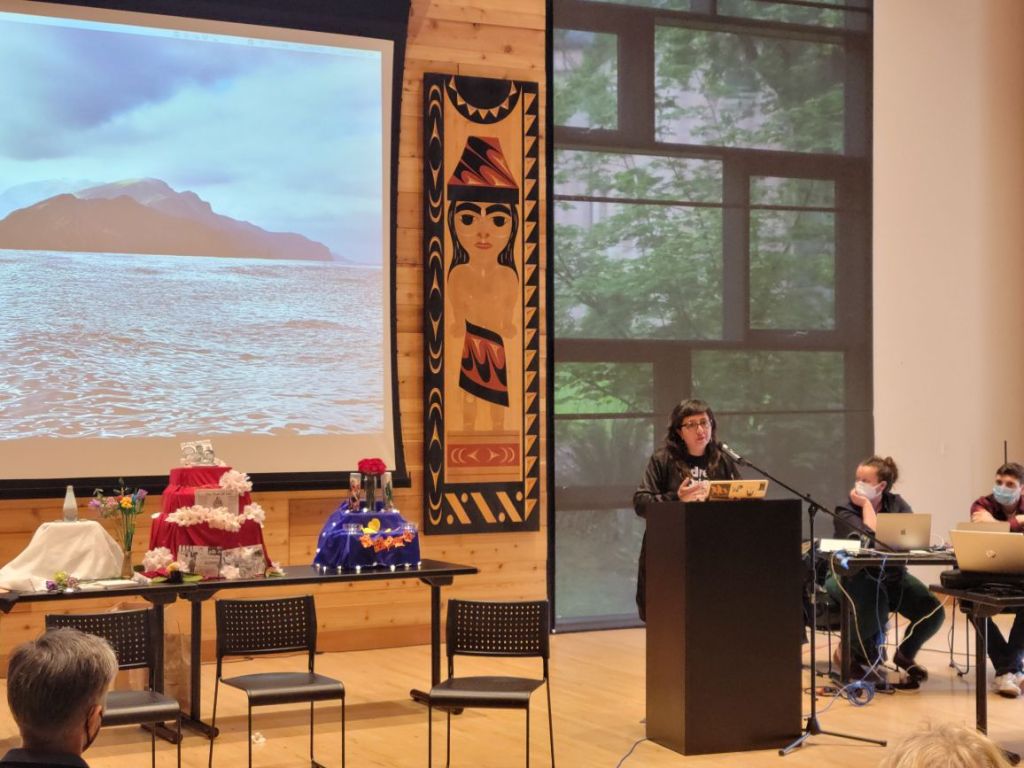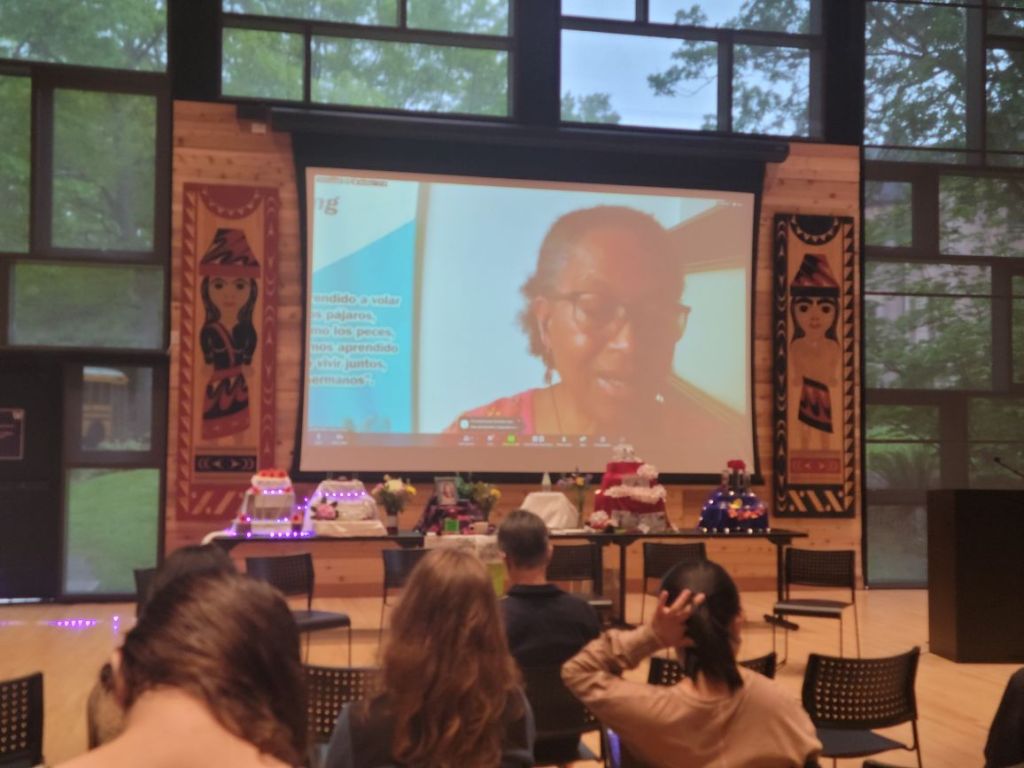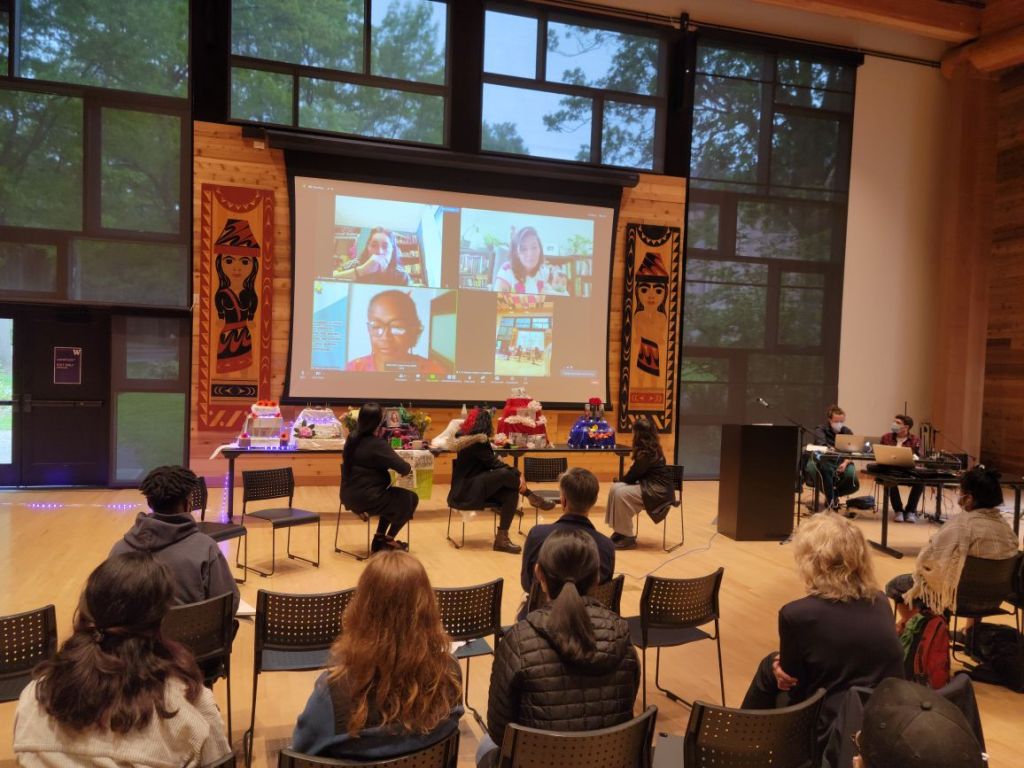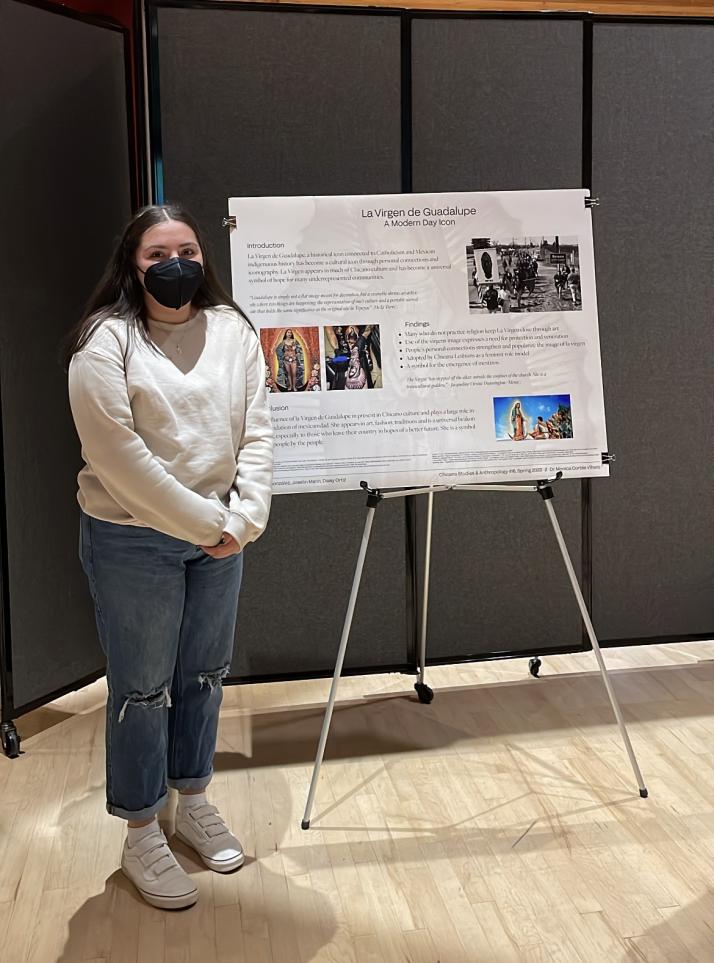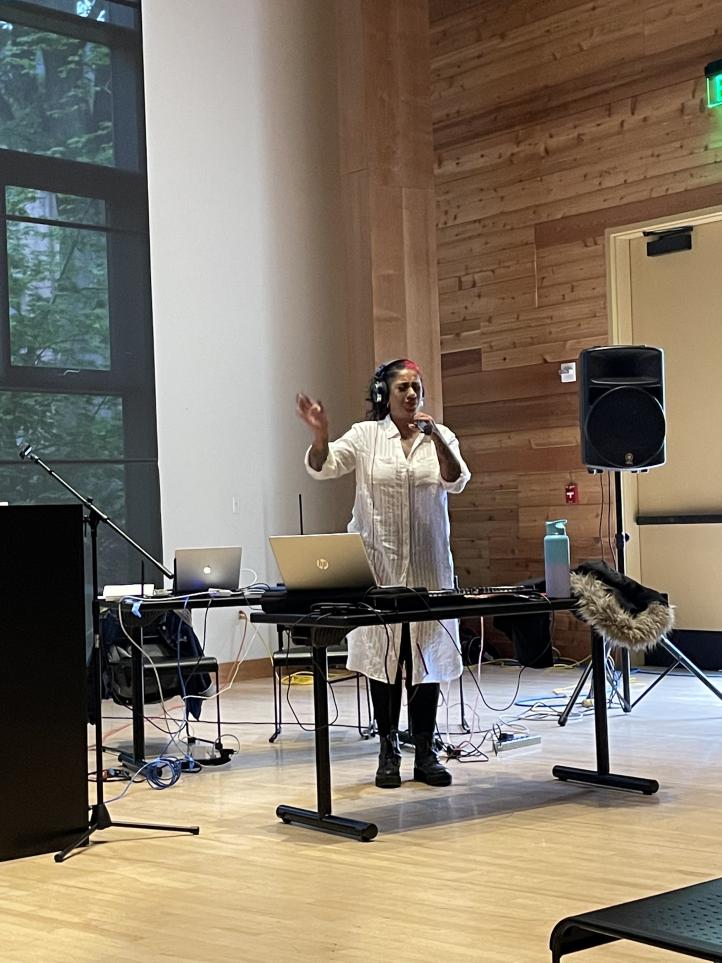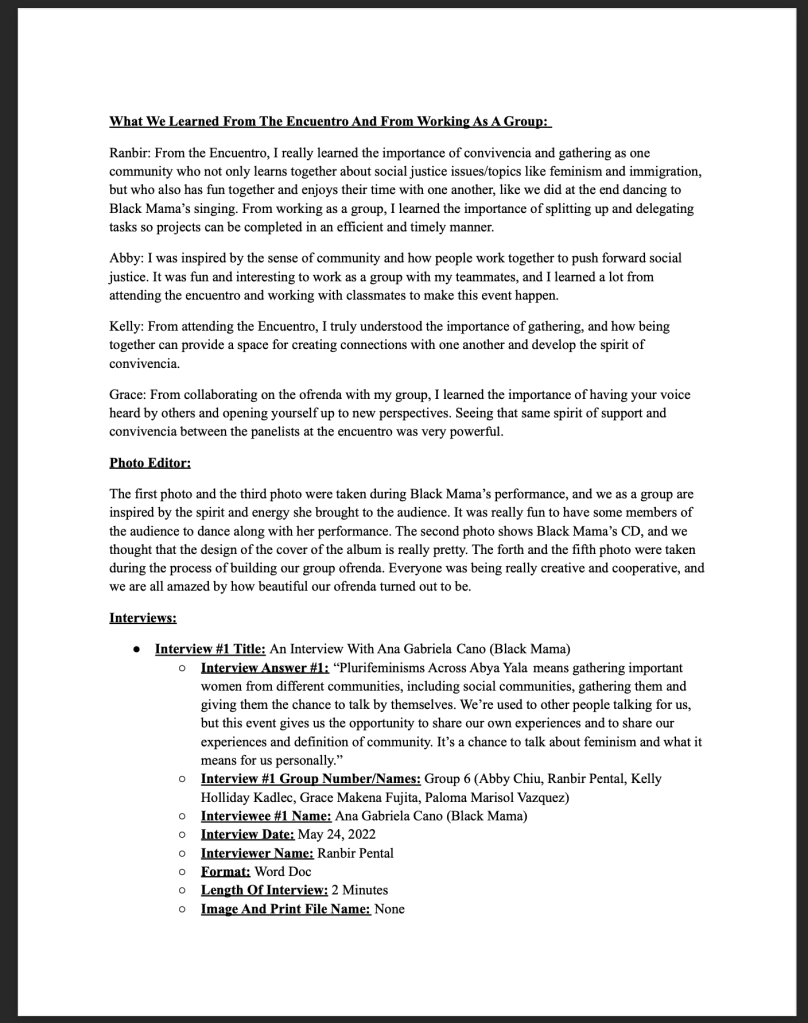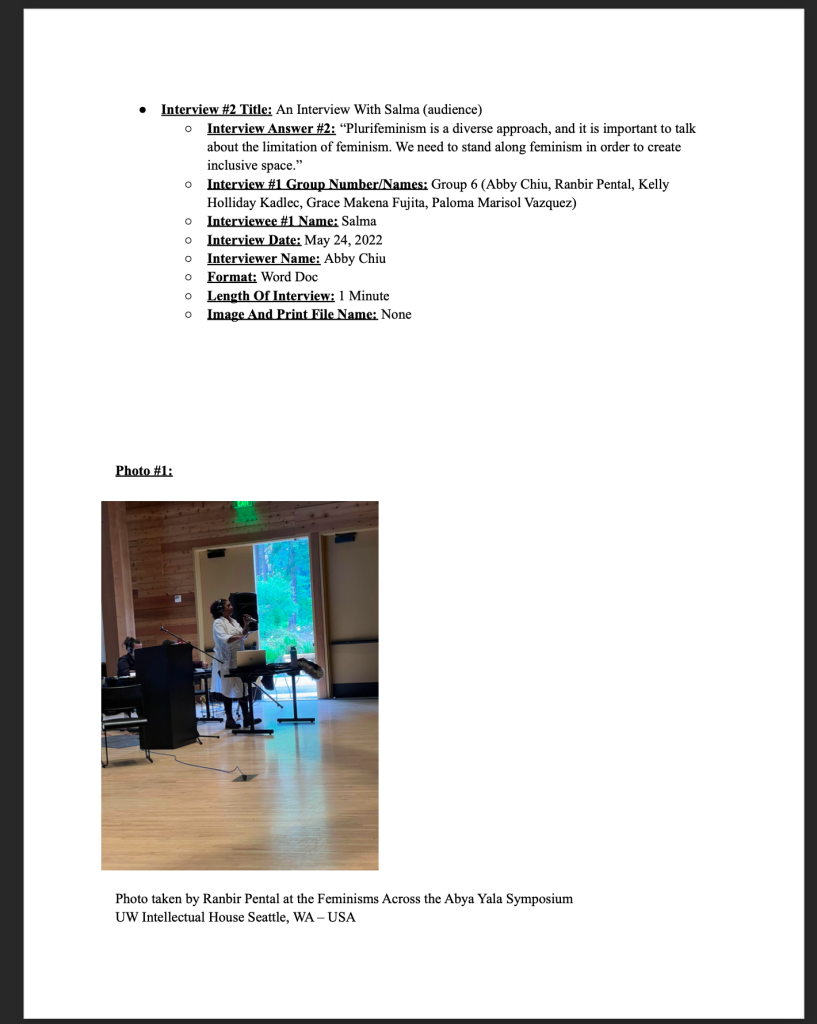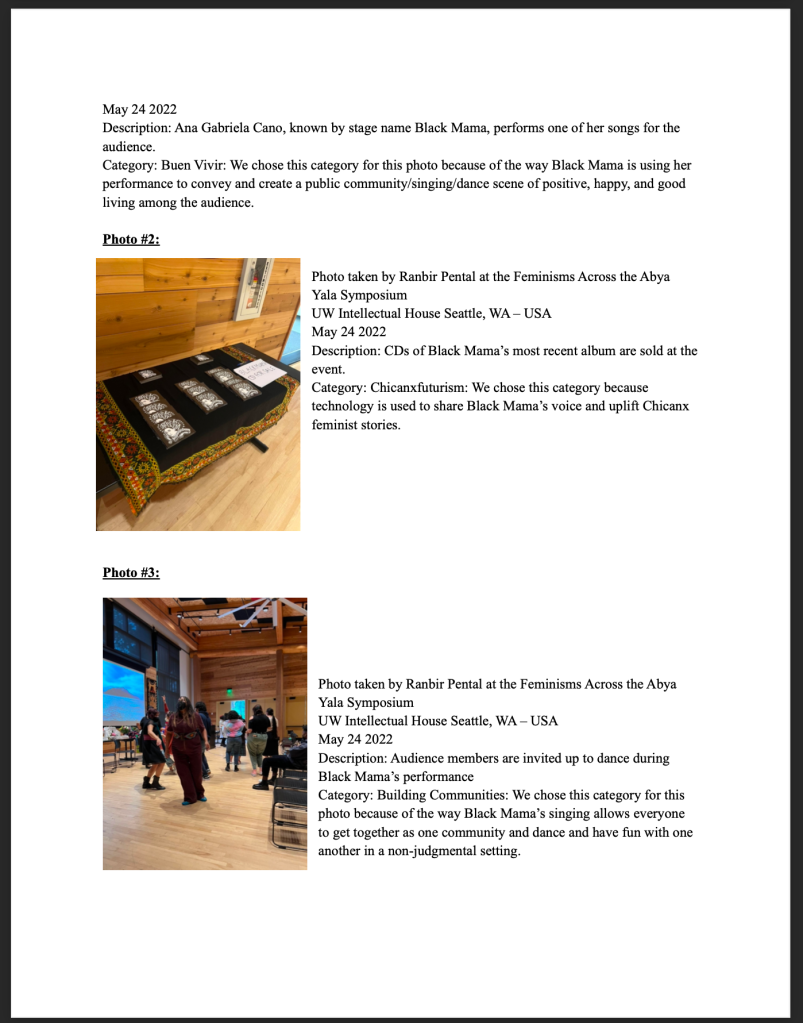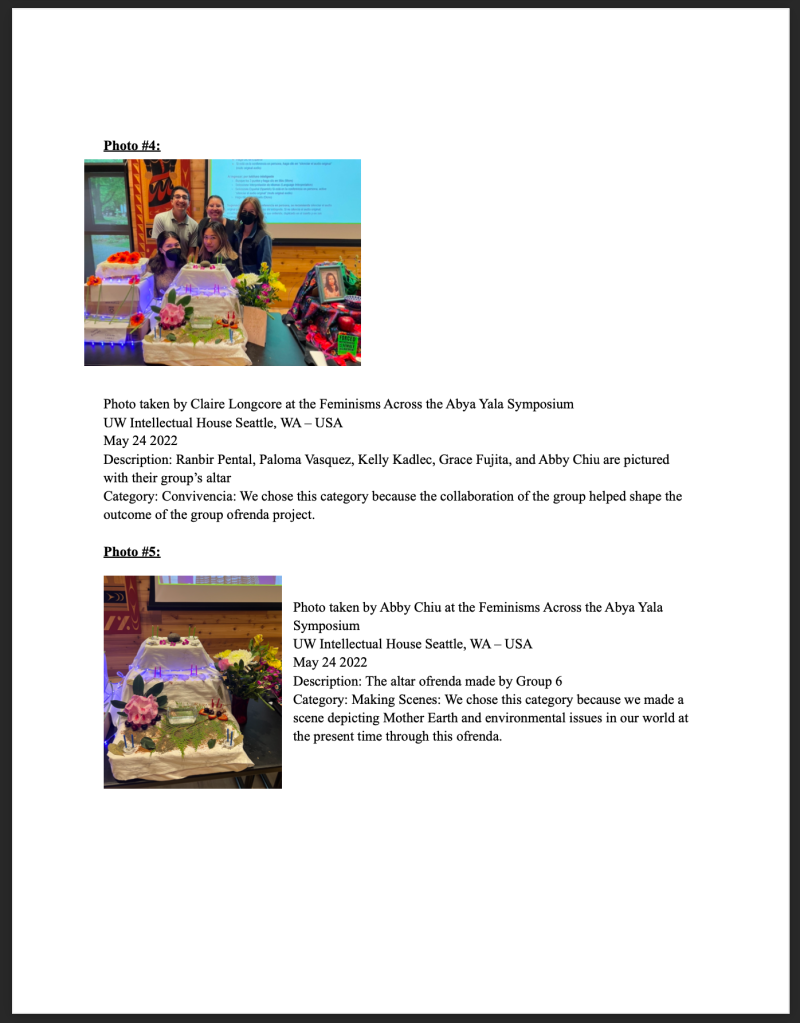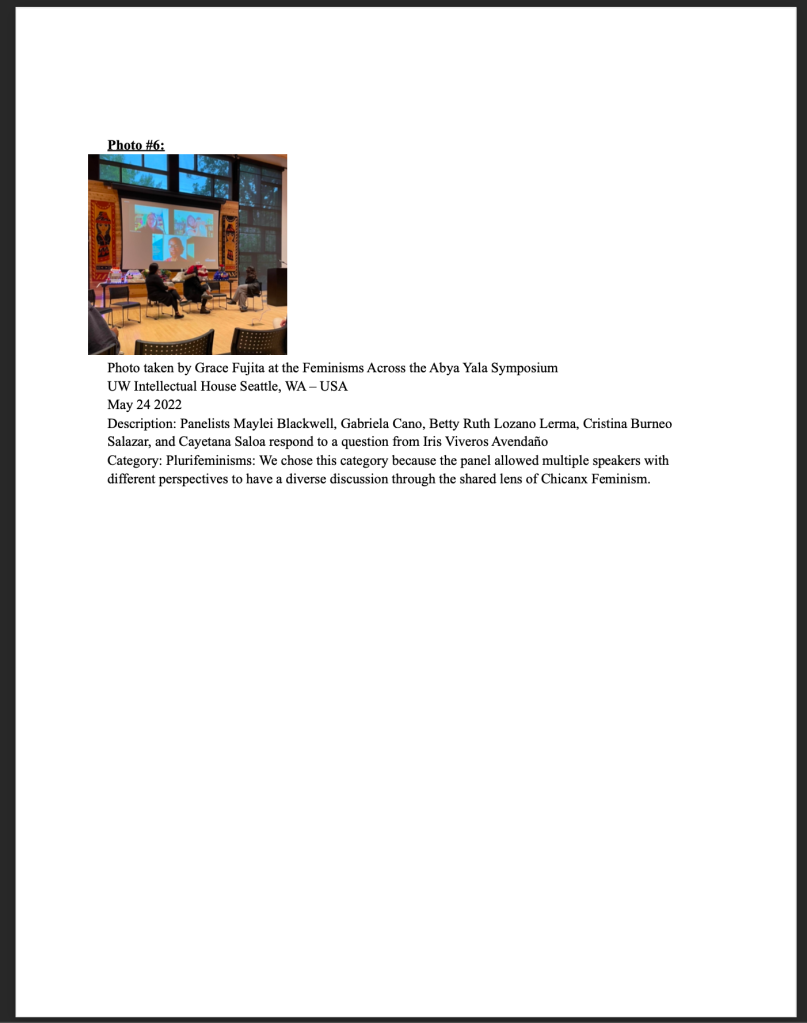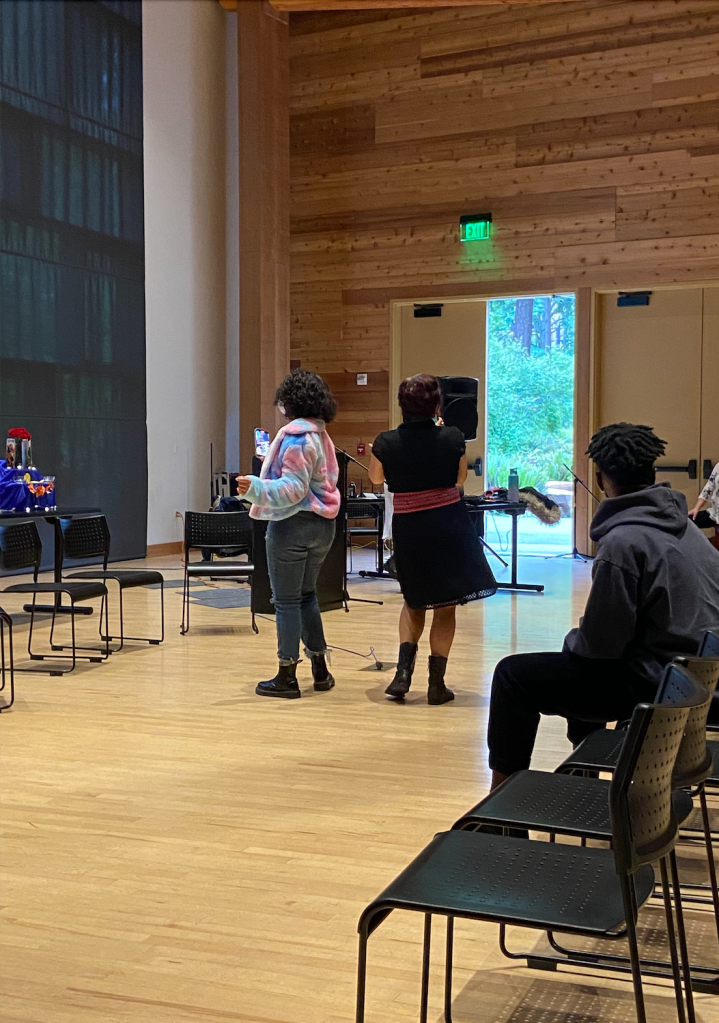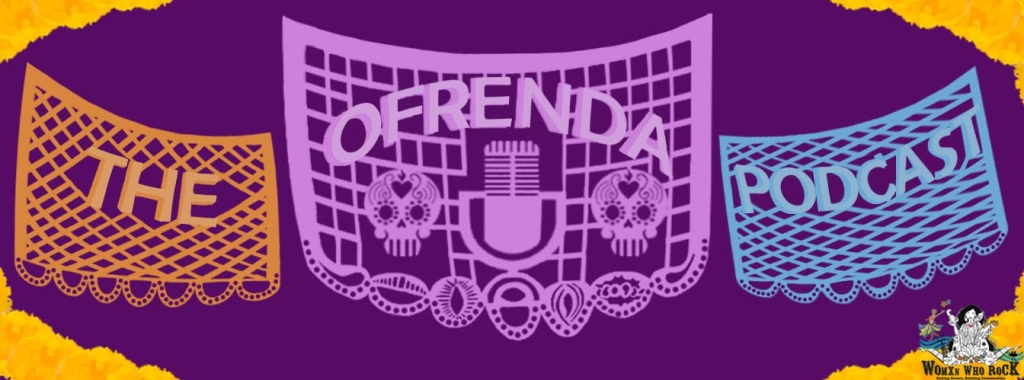
Season 2 The Ofrenda Podcast, Spring 2021
GWSS 390
Group 1 Episode Title: “The Power of Art: Healing and Resilience with Jovita Mercado”
Link: https://drive.google.com/file/d/1aEZu3fVlioOIbMpjiUi8AK2TzelVtANi/view?usp=sharing
Station ID @ 15:27
Description:
Welcome to this episode of the Ofrenda Podcast, “The Power of Art: Healing and Resilience”. Today, we’re talking about the creation of art, specifically visual art, and how it has the strength to combat social death, practice social justice, and help us learn from the past as we heal and grow as people. Ofrenda making is an art form that is very impactful to social justice and the culture of communities, and this podcast is an ofrenda dedicated to art, artists, and the changes they can inspire within their worlds and ours. Our hosts Andrea Kelsh and Tera Sterbick will take us through a discussion of art as a resilience practice, and the elements that have guided the creation of this ofrenda, as well as an interview with our special guest and UW graduate, Jovita Mercado! Jovita is a Chicana artist, and our discussion about her inspirations and struggles in her career ties back into themes of activism and community. Art is a vessel that can teach us about historical events, share the culture of groups or individuals, and give us insight into struggles that we may have never experienced. In this way, we can all learn and grow as a community by experiencing works created from different perspectives, and expanding the definition of art as we know it. Enjoy the show, and thank you for listening!
This podcast was written and produced by Director/Quality Producer Emily Buak, Guest Interview Producers/On-Air Hosts Andrea Kelsh and Tera Sterbick, Story Theme Producer Kirsten Mattes, and Sound Producer Carly Stave.
Themes:
The theme of our podcast is the power of art as a resilience practice. Ofrenda making is an art form that has become important to social justice, as it is a way to represent and bring attention to people and movements in a community. This podcast is an ofrenda dedicated to the creation of art, and how it holds the power to heal, and the power to strengthen communities. Art also has the power to combat Lisa Cacho’s concept of social death, a process where people are isolated from society because their identities don’t fit what is seen as “normal”, and are then treated as if they are dead or non-existent because they aren’t seen as valuable. Social death works by deepening the divide between marginalized groups and the rest of society, therefore dehumanizing and decreasing the sympathy held for that group. Because of this, horrific acts of violence are committed against them, oftentimes leading to actual death. Art is a unique method of combating social death, bringing important issues to the surface using strong and influential imagery.
Group 2 Episode Title: Add Ofrenda to Your Vocabulary with Francisca Garcia
Listen: https://drive.google.com/file/d/1fjZmUv9be6I5VZeXPyCJUaCk9HILedxz/view?usp=sharing
Station ID @ 14:28
Description
Today May 20th, 2021 our team: Madalyn, Mekha, Grace, Mayumi, and Mina will be having a special guest in our podcast, Add Ofrenda to Your Vocabulary. Our interviewers Mekha and Mayumi will be asking various questions for our guest! Our guest Francisca Garcia will talk about the importance of preserving her culture and fighting against colonization. She will be defining the kinds of hardships she had experienced when facing the differences in opinions with her social activism as well as the reasons behind.
Interviewee: Francisca Garcia
BIO: FOUNDER & INSTRUCTOR, Machtia. She is the Vice President and Social Equality Committee Chair. She has been sharing the Mexican culture for 45 years and was the cultural coordinator for El Centro de la Raza’s Dia de los Muertos Celebration. She is part of the founding cultural focus committee for Northwest Folklife. Through ofrendas, Francisca Garcia is able to remember her brother and her other relatives. Every year she puts out an offering of pozole for brother. She says that through ofrendas loved ones are never gone, but it’s a way to gather and talk about their loved ones that passed. d her cultural practices. Through this episode, we hope that individuals become aware of the importance of preserving one’s culture and respecting other cultures and traditions. We desire to explore our theme deeper: Mindful, Intentional Practices of Remembrance & Resistance.
Sound Producer/Audio Management: Madalyn
Director/Quality Producer: Grace Min
Story Theme Producer: Mina
Two Guest Interview Producers/On-Air Hosts: Mekha Thyparambil, Mayumi Alino
Group 3 Espisode Title: “Community Radio and Media Justice in relation to Immigration during the COVID Pandemic” with Monica De La Torre (Media Justice Studies & Community Radio Scholar, Radio KDNA & School of Transborder Studies Professor)
Listen: https://drive.google.com/file/d/1VDs_fAbWDLql6uHiMnqg2fVsqI9RaTx2/view?usp=sharing
Station ID @ 14:30
Description:
“It’s time for the Ofrenda Postcast! A series of special episodes dedicated to learning more about the roots and futures of ofrenda practice and how this tradition throughout the year in preparation for El Dia de Muertos celebrations. Each year celebrations are planned for Seattle Center, Beacon Hill, Burien, White Center, Tacoma and places all throughout the United States and Mexico. In our episode “Community Radio and Media Justice in Relation to Immigration during the COVID Pandemic” we explore the theme of how community radio and media justice function to challenge society’s understanding of immigration issues during COVID.
My name is Madeline Kerbs, I was our group’s Story Theme Producer next speaking will be Keely Wolfer or team Director. Our Interviewer will be Alexya Rayo and our podcast editor is Justine Jacobs. We are a team of Univeristy of Washington Students enrolled in the Gender, Women & Sexuality Studies Department’s course called “Art, Music,& Feminist Resilience In The Borderlands” taught by professor Michelle Habell-Pallan. We produced this episode in partnership with KVRU 105.7 FM Radio, Highline Heritage Museum’s ‘Our Voices: Social Justice in times of COVID-19’, and the Womxn Who Rock: Making Scenes, Building Communities Collective. Will be talking with Monica De la Torre. And now, our show!”
Focusing on how COVID-19 has impacted media and social injustice allows us to examine ways in which we can combat social death relating to immigration. By listening to victims and survivors first hand, and spreading awareness through the media, we extend our scope to encompass more stories and in turn, develop a more inclusive perspective. Lisa Cacho, a professor of Latino/Latina Studies at the University of Illinois, touches on the concept of “social death.” This refers to the glossing over and erasure of hardships for the underprivileged by our government and society. By remembering those victims of injustice and investigating the deeper rooted issues of patriarchy within our society, we will not participate in social death. In remembering those victims, we challenge the view that women are disposable and by listening it lends a first hand narrative to its listeners and restores humanity to the female victims. In doing so, this is an act of a restorative resilience practice and we are respecting those victims who deserve to be remembered. In using the media to spread awareness of social injustice and ways to help, we are reaffirming those lives that have been lost.
Outro theme:
There are so many profound takeaways that we are leaving this conversation with, and we hope that our listeners will walk away from this feeling inspired as well. Black Mama’s experiences with art and music throughout the pandemic as a form of release and a way to maintain her mental health is exemplary of how powerful art can be as a source of healing and community. Her fellow creators and listeners have been able to support and inspire each other through unprecedented and extremely difficult times because of their pre-existing communal support system based on care. Black Mama’s description of art as a way to feel “human” and “in touch with other people” sums up what we have felt as a collective over the past year as many of us have lost and been physically separated from loved ones. The need for healing at this historical moment is truly immense. Art and music are already part of our daily lives, but if we delve into this artistic sector with intention and compassion as we see Black Mama do in her work and life, we will be participating in a movement of profound healing and social change.
One thing that I think is so striking about Black Mama and her work is how integral her politics and practice are in her daily life. In our conversation, she spoke about how her feminism exists on her stage, in the streets of her community, and in her home raising her children. It is her life and experience that inspires her work, and it is the influence of her work that motivates her to keep living with such purpose. She is a living example of music as a feminist practice of resilience, and her music is itself an ofrenda to the women in her community and across the globe. It creates a space for these silenced and oppressed communities to feel seen and heard, and for them to amplify their voices. Black Mama’s voice is a call for us not to hesitate, but to speak and create with whatever we have, and if we can’t do that, to be a support to those that are suffering the most, especially in times of immense global pain and loss. The very practice of creating art and music, or simply supporting these creators, is a refusal to succumb to the hegemonic structures that attempt to silence marginalized groups. By continuing to celebrate the existence and survival of Chicanas, Ecuadorian women, and women of color, we are building a collective movement for social justice and healing and reimagining a more equitable world.
Need teams and themes:
Group 4 Episode Title: “Creating a Sonical Movement with Black Mama”
Listen: https://drive.google.com/file/d/1RJ31MqlgzSgMbWwYExv8PQ6CV_KDhdP3/view?usp=sharing
Station ID @
Description:
We hope you enjoy this podcast episode, “Creating a Sonical Movement with Black Mama”, hosted by Kambria Mcdonald. We built this episode around the theme of music as a feminist practice for activism and social healing, reflecting our studies of resilient Chicana art and music, and how the Chicana ofrenda operates as a sacred cultural tradition and display of feminista resistance. This inspiring conversation features Afro-Ecuadorian hip hop artist Ana Gabriela Camo, aka Black Mama, and her experiences as a mother, artist, activist fighting for social change through her work and her daily practice. Black Mama speaks about how music and her artistic community have inspired and supported her throughout the COVID-19 pandemic, and how we need music as a source of healing, especially during unprecedented and deeply challenging times. She discusses her journey with music and feminism, and how her feminist practice has become an integral part of her daily life, relationships, and the way she is raising her children. Behind the scenes, we had Arianna Huston as Sound Producer, Lucas Horowitz as Director and Quality Producer, and Madelyn Johnson as Story Theme Producer.
Themes:
Intro Theme:
In Michelle Habell-Pallan’s course, we have explored the history of Chicana art, how it has shifted overtime, and how we can rewrite historical voices through artwork to amplify voices that have been silenced by colonialism and patriarchy. We have examined the art of ofrenda making as a practice of feminist resilience, and music and dance as a way to build communities of resistance against racist, colonialist, and patriarchal structures of oppression. Women create altars within the domestic space by arranging sentimental family pieces or memorabilia, or any metaphorical things of beauty or meaning to cultivate a sacred space for the feminine voice within the household. This art allows them to take up space and resist the gendered familial roles imposed by colonial cultural values and by cultural patriarchal norms. It has been our privilege to explore ofrenda-making on a personal level by planning our own ofrendas based on a social justice topic related to COVID-19.
We have also learned about local groups and movements, such as the Seattle Fandango Project, that create art and community through a practice of joyful cultural celebration. These practices allow Chicanas and other minoritized groups to connect with their cultural roots, carrying on sacred traditions. By refusing to be silenced and continuing to create, these groups and artists resist the phenomenon that Lisa Cacho terms “social death”, which refers to the literal and figurative death of cultures and people of color. In the time of COVID-19 we are lapsing deeply into existing cultural norms of women as leaders of the domestic sector. The impact of these gendered identities are disproportionately harmful to Women of Color as they are systemically impoverished and are more likely to be the heads of single-parent households. Furthermore, as economies crumble due to the effects of COVID-19, hegemonic politics are ever more reliant on the fulfillment of gendered and racialized social roles. In the midst of this global crisis, art is becoming an even more instrumental and valuable tool in the building of better, more caring communities and working towards collective healing. People have been faced with impossible dilemmas, such as whether to keep their essential worker jobs, or stay home to take care of their children while school is being held remotely. In times of social distance, it has been ever more difficult to build supportive communities and to receive the help one needs. The pandemic has made it clear that our planet and the people on it require a deep level of healing that can only be achieved through mutual aid and better communities, which can be woven and built through the creation of art in many forms. In this podcast episode, we are excited to explore these themes with a hip hop artist that has cultivated her own activism, care web, and healing through the music she creates.
Podcast Roles:
- Sound Producer/Audio Management: Arianna Huston
- Guest Interview Producer/On-Air Host: Kambria McDonald
- Story Theme Producer: Madelyn Johnson
Director/Quality Producer: Lucas Horowitz
Group 5 Episode Title: “Resilient Rhythms with Iris C. Viveros Avendaño”
Listen: https://drive.google.com/file/d/1_weeGQ0YNfsrD86a3tyeAmR0ac8Do838/view?usp=sharing
Station ID @ 14:59
Description:
In this episode, Resilient Rhythms, we have a conversation with Iris C. Viveros Avendaño, “a Ph.D. student and Mc Nair Scholar whose academic interests emphasize the integration of third world feminist approaches to the analysis of colonial legacies and projects in present-day systems of violence” (Iris Viveros Avendaño | Department of Gender, Women & Sexuality Studies | University of Washington). We discuss Fandango as a producer of knowledge, healing, and remembrance, as well as Iris’s experiences and how they have influenced her work and perspective. This was made possible thanks to the guidance of Michelle Habell-Pallán, a wonderful University of Washington professor in the department of Gender, Women & Sexuality Studies and adjunct professor in the School of Music and department of Communication. The podcast was created by Shaiana Cornejo, the guest interview producer/on-air host; Mikey Prince, sound producer and audio manager; Will Sanchez, story theme producer; and Brianna Szabo, director/quality producer.
Interviewee & Topics
Interviewee: Iris Viveros Avendaño
Topic: Fandango, collective polyrhythmic music making as resistance and healing
Group Members:
- Shaiana Cornejo
- Mikey Prince
- Will Sanchez
- Brianna Szabo
Podcast Roles:
- Sound Producer/Audio Management: Mikey Prince
- Guest Interview Producer/On-Air Host: Shaiana Cornejo
- Story Theme Producer: Will Sanchez
- Director/Quality Producer: Brianna Szabo
Feminsims in the Borderlands
Group 1 Episode Title: “Mixing it up with Maya Jupiter” https://drive.google.com/file/d/1eQ975FUYM6_oR_XDxMzDX9gU_xkG8GV5/view?usp=sharing
Station ID @ 14:19
Description:
Mixing it up with Maya (Maya Jupiter is an Australian hip-hop artist, activist and philanthropist_. Maya was the national voice of Hip-Hop, producing and hosting iconic programs on Australian television and radio. Jupiter’s artivism began early in her career, facilitating hip hop song writing workshops with underserved youth in Sydney. Now in Los Angeles, Maya is on the advisory board at Peace Over Violence, a rape crisis education and prevention center, and is a spokesperson for their Denim Day campaign. She was recognized with their Voice Over Violence Humanitarian Award. Maya has received Tiyya’s Owliya Community Leadership Award, The East LA Community Corporations Mujer Guerrera Award and is the co-recipient of the Southern Christian Leadership Conference’s Social Justice Fighter Award along with her husband Aloe Black. Maya co-founded Artivist Entertainment to provide support and produce events for artists who use their work to promote positive social transformation. Recently, Artivist produced online events for the #CancelRent and #HomesForAll movement to provide relief to families during the Covid-19 pandemic. Jupiter’s third solo album, Never Said Yes, produced by Grammy award winner, Quetzal Flores, explores themes that intersect feminism, activism, and revolutionary motherhood. So without further ado, let’s welcome our guest, Maya Jupiter!
As we are all aware, the COVID-19 pandemic has been a major catalyst for social death amongst minority communities in particular. During times like this, it’s not uncommon for people to feel lost or alone, but we believe that art can be used to combat these feelings of confusion and loneliness, especially during a time where everyone seems separate from one another. Therefore, in our podcast, we decided to talk to Maya Jupiter about how she has personally used her musical art as a form of resilience against social death, especially during the COVID-19 pandemic. Maya Jupiter, a Mexican-born Australian rapper, uses her music as a means to promote positive social change in our society and around the world, attempting to prevent social death amongst marginalized communities. In much of her music, she utilizes the themes of earth and roots, such as in her song “Madre Tierra”, in order to portray the important role women play in many facets of our society. Therefore, we centered our podcast around Maya Jupiter’s connection to marginalized communities and how she has used artivism as a means to support and uplift these communities. In particular, we hope to gauge Maya Jupiter’s personal experience with COVID-19 and how this pandemic has disproportionately affected marginalized communities, and how she believes music can be used to combat social death and decrease these feelings of isolation.
Group Members Names and Podcast Roles
Hannah Lea (hgl18@uw.edu) Director/Quality Producer
Riley Mehl (rmehl@uw.edu ) Sounds Producer/Audio Management
Elise Aydelott (aydele@uw.edu ) On Air Host
Ryan Flynn (rjflynn@uw.edu ) On Air Host
Ivan Belikov (ivanb13@uw.edu ) Story Theme Producer
Podcast Theme: Social death, art, and COVID-19
Group 2 Episode Name: “Decolonial Organizing & De-Gentrification through Housing Mutual Aid with Quetzal Flores”
Listen: https://drive.google.com/file/d/1slslKm-QOgWME5b1iftmqDEO3M4SNlz8/view?usp=sharing
Station ID @ 15:01
Description:
In our episode, Decolonial Organizing, we explore the theme of community organizing in the time of COVID-19 with our special guest, Grammy award winner Quetzal Flores. (Chicano activist, advocate and cultural organizer, member of the band Grammy-winning band Quetzal, and current director of Art and Culture of the East Los Angeles Community Corp).
In this episode we discuss how COVID-19 has impacted Chicano communities in LA as well as Seattle, the legacy of colonialism, the inequalities of our modern capitalist, patriarchal societyand how these systems of injustice fracture rather than connect communities of color. We learn about grass roots movements for housing equality and cultural advocacy through the work of LA food vendors and how food, especially street food, can act as a means to protect cultural traditions. And we learn what we can do to further these and other housing advocacy movements in our own communities across the country.
This episode is created and produced by Emily Arron, Emma Ottosen, Dacia Price, Marlene
Probst and Ariana Rastani, with guest Quetzal Flores
Connecting Podcast to the Elements:
Although we didn’t discuss the elements directly, Quetzal Flores discussed them in the abstract, with a particular emphasis on Earth through its commodification in our modern capitalist society contrasted against its ability to sustain — through housing initiatives and farming — as well as its link to identity, movement, and the culture of indigenous people globally.
Fire was metaphorically discussed when we consider the fire that fuels Flores’ activism, his passion for imagining a world outside the confines of capitalism, and in the very real plight of street food vendors — the fire with which they cook their food is a vital component to their livelihood within the capitalist framework and beyond it as a way to support and connect with their cultural identity.
Throughout the interview, Flores continuously refers to capital — to money — as a flow in much the same way water flows, and so we can consider this language choice an allegory to elemental water, though here that water has been contaminated, then forced to run counter to its natural flow. Instead of gathering to roll downhill, in capitalist America it is being redirected back up so that the rich stay rich and the poor remain, as always, in poverty.
Air in our podcast comes in the shape of language and Flores’ final sentiment about the language of privilege as a means of gatekeeping; without knowing the language — literally or figuratively – – one cannot participate in the conversation, and being excluded from the conversation means being without a voice — without representation — when decisions are made. All of this builds to Flores’ critique of modern capitalism and his assertion that equality will never come from within this system but must be constructed from beyond its reach.
Podcast Themes:
● Chicano Art and Culture: who has access, how it’s preserved, why it’s important to
maintain
● Colonialism: its legacy on Chicano art and culture, its impact on the earth and indiginous
peoples, its history of violence and destruction
● Capitalism, Patriarchy and Systemic Injustice: how its colonial roots have created a world
that commodifies indiginous art and culture while simultaneously stifling its expression,
imagining a world outside capitalist framework.
● Activism in the time of COVID: what we can do to change the system from within, how
COVID is impacting Chicano communities
Interviewee & Topic:
Quetzal Flores (Chicano activist, advocate and cultural organizer, member of the band
Grammy-winning band Quetzal, and current director of Art and Culture of the East Los Angeles Community Corp) — Art and Decolonization
Group 3 Episode Title : “Getting Your Period Back: Understanding Legal and Cultural Barriers to Getting an Abortion with Prof. Cristina Burneo” https://drive.google.com/file/d/1tmVQardPnXCeiqB4qgPtjsdtfY2vtj_D/view?usp=sharing
Station ID @ 15:38
Description:
The podcast titled “Getting Your Period back: Understanding Legal and Cultural Barriers to Getting an Abortion” discusses the influence and impact that covid has brought to light all of the problems that many marginalized communities face. Our guest speaker for the podcast, Dr. Burneo, is a Professor at the Universidad Andina, Simon Bolivar, in Ecuador, has published many books and essays that focus on human rights and gender. Through our talks with her, we will learn the many contemporary issues and controversies that occur in Ecuadorian society, notably in reproductive rights. By connecting with our current circumstances, the coronavirus pandemic, we will put in contemporary context how our progress in reproductive rights and other pressing issues have been either hindered or propelled by the pandemic.
The questions that our podcast included have stemmed from course readings, internet articles, and our personal experiences. These questions range from the colonial history of women’s reproductive rights to covid’s sexual and health influence of women in Ecuador or around the world. We hope that by offering insights to these questions, our listeners will not only gain more knowledge about reproductive rights of women from a unique perspective, but also to connect to our current circumstances, thus enabling us to envision what the future holds in our movement of women’s reproductive rights.
Episode created by group three in Honors 394: Feminisms in the Borderlands course, as part of the podcast project. Members of the group include Alexis Huerta, Auria Coons-Hale, Helen Zhao, Sommer Ullrich, and Angelique Rodriguez, and the podcast is entirely recorded and monitored remotely.
Themes:
- Assess the influence covid has brought to light all of the problems many marginalized communities face in reproductive justice
- Connecting to the history, past progresses, and movements of reproductive justice in both Ecuador and worldwide
- Connecting to the many factors that play a role in reproductive justice, such as class, social issues, and intersectionality
- Connecting to the barriers of reproductive justice and advice for moving forward
- Put reproductive justice in context with the current circumstances of the coronavirus pandemic, and accessing how the pandemic plays a role in the advancement of reproductive justice
- Learn about Dr. Burneo’s work surrounding human rights and gender, and think about how we all can make a difference in helping marginalized communities
- Connecting to course materials such as “Our Voices: Social Justice in Times of Covid-19” and the defined elements of earth, fire, water, and air/wind
- Reflecting resilience practices against social death amidst the covid pandemic
Group 4 Podcast/Episode Title: “Highlighting Heritage Museum with Nancy Salguero”
https://drive.google.com/file/d/1_PJpwKxI11MEaAuZ9YMvE7akzuNSmfbW/view?usp=sharing
Station ID @ 14:
Description
In this episode, Grace and Anisa interview Ms. Salguero-McKay in order to fully understand her work at the Museum, and the resilience that must come after adversity. Highlighted features include the importance of a welcoming atmosphere for all, changing how we view one another and acceptance. Through much of her responses, Nancy Salguero McKay took great strides to establish her desire to use the Highline Heritage Museum to educate people on subjects they may not otherwise understand or acknowledge. Of particular importance to Ms. McKay was a focus on providing education and illustration to individuals who had rarely if ever visited a museum before. For example, Salguero-McKay recalled three instances where families came into the museum to experience history and culture that they had otherwise never studied. In recalling these moments, Salguero-McKay helped to establish that she greatly cared about the community, and wished to enhance the cultural sensitivity of said community. Salguero-McKay also expressed this viewpoint through a sincere acknowledgment of her heritage and origins in Mexico City. In her words, these aspects, though important to her identity, were only one facet of who she was as a person. Salguero-McKay then used this acknowledgment of all she was as a metaphor to help clarify her strong advocacy for inclusion. Overall, by providing these examples, Ms. McKay helped to establish her inclusive goals as executive director of the Highline Heritage Museum.
Group Members:
- Lauren Gang
- Grace Anderson
- Mac Gormley
- Alex Barga
- Tongyu Wu
- Anisa Navarro
Roles:
- Sound Producer/Audio Management: Alex Barga
- Sound Producer/Audio Management: Tongyu Wu
- Guest Interview Producer/On-Air Host: Grace Anderson
- Guest Interview Producer/On-Air Host: Anisa Navarro
- Story Theme Producer: Mac Gormley
- Director/Quality Producer: Lauren Gang
Interviewed Guest Information:
● Name: Nancy Salguero-McKay
●Organization: Highline Heritage Museum
●Topic of interview: Resilience in times of COVID-19; Work at the H.H. Museum
Podcast Themes
●Social death
●Resilience
●Persistence

